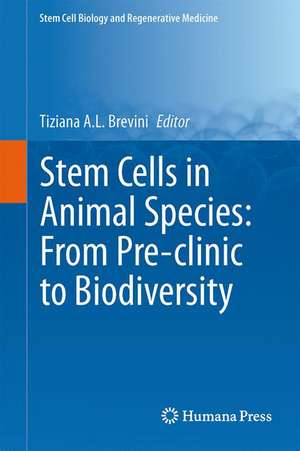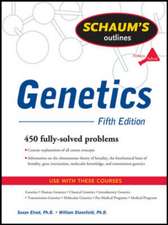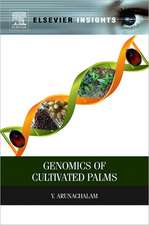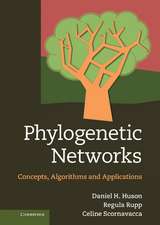Stem Cells in Animal Species: From Pre-clinic to Biodiversity: Stem Cell Biology and Regenerative Medicine
Editat de Tiziana A. L. Brevinien Limba Engleză Hardback – 11 sep 2014
The second part of this book describes recent efforts to use stem cells for preserving endangered species, including the snow leopard and coral reefs. From this perspective, stem cells are an invaluable tool to preserve bio-diversities. Frozen cells and gametes can be obtained from animals at risk of extinction and even from microorganisms and corals suffering from heavy changes in the eco-system; this may allow the cultivation of a generation of stem cell lines and represents an exciting opportunity to support and ensure the conservation of precious varieties of living creatures. This discussion leads easily into the third section, which discusses stem cell banking as a way of safeguarding these endangered species.
| Toate formatele și edițiile | Preț | Express |
|---|---|---|
| Paperback (1) | 635.65 lei 6-8 săpt. | |
| Springer International Publishing – 10 sep 2016 | 635.65 lei 6-8 săpt. | |
| Hardback (1) | 641.85 lei 6-8 săpt. | |
| Springer International Publishing – 11 sep 2014 | 641.85 lei 6-8 săpt. |
Din seria Stem Cell Biology and Regenerative Medicine
- 15%
 Preț: 641.71 lei
Preț: 641.71 lei - 18%
 Preț: 625.05 lei
Preț: 625.05 lei - 18%
 Preț: 958.07 lei
Preț: 958.07 lei - 18%
 Preț: 897.65 lei
Preț: 897.65 lei - 18%
 Preț: 1122.56 lei
Preț: 1122.56 lei - 18%
 Preț: 1118.62 lei
Preț: 1118.62 lei - 18%
 Preț: 1556.64 lei
Preț: 1556.64 lei - 18%
 Preț: 1222.31 lei
Preț: 1222.31 lei - 18%
 Preț: 1280.72 lei
Preț: 1280.72 lei - 18%
 Preț: 948.61 lei
Preț: 948.61 lei - 18%
 Preț: 1280.24 lei
Preț: 1280.24 lei - 5%
 Preț: 779.16 lei
Preț: 779.16 lei - 18%
 Preț: 1278.02 lei
Preț: 1278.02 lei - 18%
 Preț: 947.35 lei
Preț: 947.35 lei - 18%
 Preț: 949.55 lei
Preț: 949.55 lei - 18%
 Preț: 951.29 lei
Preț: 951.29 lei - 18%
 Preț: 953.65 lei
Preț: 953.65 lei - 15%
 Preț: 691.12 lei
Preț: 691.12 lei - 18%
 Preț: 1220.75 lei
Preț: 1220.75 lei - 18%
 Preț: 956.81 lei
Preț: 956.81 lei - 15%
 Preț: 643.16 lei
Preț: 643.16 lei - 18%
 Preț: 1229.91 lei
Preț: 1229.91 lei - 15%
 Preț: 693.71 lei
Preț: 693.71 lei - 18%
 Preț: 944.99 lei
Preț: 944.99 lei - 15%
 Preț: 692.74 lei
Preț: 692.74 lei - 18%
 Preț: 1222.01 lei
Preț: 1222.01 lei - 15%
 Preț: 696.18 lei
Preț: 696.18 lei - 18%
 Preț: 959.98 lei
Preț: 959.98 lei - 18%
 Preț: 963.91 lei
Preț: 963.91 lei - 18%
 Preț: 1380.47 lei
Preț: 1380.47 lei - 15%
 Preț: 690.44 lei
Preț: 690.44 lei - 18%
 Preț: 1837.45 lei
Preț: 1837.45 lei - 15%
 Preț: 646.11 lei
Preț: 646.11 lei - 18%
 Preț: 1118.62 lei
Preț: 1118.62 lei - 5%
 Preț: 777.55 lei
Preț: 777.55 lei - 18%
 Preț: 1222.01 lei
Preț: 1222.01 lei - 18%
 Preț: 1241.73 lei
Preț: 1241.73 lei
Preț: 641.85 lei
Preț vechi: 755.13 lei
-15% Nou
Puncte Express: 963
Preț estimativ în valută:
122.83€ • 133.38$ • 103.18£
122.83€ • 133.38$ • 103.18£
Carte tipărită la comandă
Livrare economică 22 aprilie-06 mai
Preluare comenzi: 021 569.72.76
Specificații
ISBN-13: 9783319035710
ISBN-10: 3319035711
Pagini: 197
Ilustrații: XI, 186 p. 36 illus., 26 illus. in color.
Dimensiuni: 155 x 235 x 17 mm
Greutate: 0.46 kg
Ediția:2014
Editura: Springer International Publishing
Colecția Humana
Seria Stem Cell Biology and Regenerative Medicine
Locul publicării:Cham, Switzerland
ISBN-10: 3319035711
Pagini: 197
Ilustrații: XI, 186 p. 36 illus., 26 illus. in color.
Dimensiuni: 155 x 235 x 17 mm
Greutate: 0.46 kg
Ediția:2014
Editura: Springer International Publishing
Colecția Humana
Seria Stem Cell Biology and Regenerative Medicine
Locul publicării:Cham, Switzerland
Public țintă
ResearchCuprins
Stem Cells in Dystrophic Animal Models: from Pre-clinic to Clinical Studies.- Understanding Tissue Repair through the Activation of Endogenous Resident Stem.- Large Animal Induced Pluripotent Stem Cells as Models of Human Diseases.- Fetal Adnexa Derived Stem Cells Application in Horse Model of Tendon Disease.- Using Stem Cells to Study and Preserve Biodiversity in Endangered Big Cats.- Pluripotent and Multipotent Domestic Cat Stem Cells: Current Knowledge and Future Prospects.- Brief Introduction to Coral Cryopreservation: an Attempt to Prevent Underwater Life Extinction.- Fundamental Principles of a Stem Cell Biobank.- Freezing and Freeze-Drying: the Future Perspective of Organ and Cell Preservation.
Notă biografică
Dr. Tiziana A.L. Brevini is currently an Associate Professor of Anatomy and Embryology at the University of Milan, Italy. She studied the interactions between the female genital tract and the maturing oocyte in the Department of Molecular Embryology at the University of Cambridge, U.K. She completed her doctorate degree in Endocrinology and Metabolic Sciences at the University of Milan, Italy, and then carried out research at Monash University in Melbourne, Australia, and at the University of Adelaide in Adelaide, Australia. Her main areas of research focus on the understanding of cell differentiation and commitment, epigenetic control of cell fate and pluripotency-related networks in mammalian cells and embryos.
Textul de pe ultima copertă
This volume focuses on stem cell research and disease modeling in non-murine species. The book is divided into three parts: Stem Cells for Pre-Clinical Models, Stem Cells in Non-Conventional Species, and Stem Cell Banking for the Future. The first section presents an overview of the different pre-clinical stem cell models recently created in animal species, including the porcine model for heart failure, iPSC in large animal species, Duchenne muscular dystrophy and canine embryo-derived stem cells and modeling for human diseases. This section also discusses the potential advantages and applications of these models.
The second part of this book describes recent efforts to use stem cells for preserving endangered species, including the snow leopard and coral reefs. From this perspective, stem cells are an invaluable tool to preserve bio-diversities. Frozen cells and gametes can be obtained from animals at risk of extinction and even from microorganisms and corals suffering from heavy changes in the eco-system; this may allow the cultivation of a generation of stem cell lines and represents an exciting opportunity to support and ensure the conservation of precious varieties of living creatures. This discussion leads easily into the third section, which discusses stem cell banking as a way of safeguarding these endangered species.
The second part of this book describes recent efforts to use stem cells for preserving endangered species, including the snow leopard and coral reefs. From this perspective, stem cells are an invaluable tool to preserve bio-diversities. Frozen cells and gametes can be obtained from animals at risk of extinction and even from microorganisms and corals suffering from heavy changes in the eco-system; this may allow the cultivation of a generation of stem cell lines and represents an exciting opportunity to support and ensure the conservation of precious varieties of living creatures. This discussion leads easily into the third section, which discusses stem cell banking as a way of safeguarding these endangered species.
Caracteristici
Focuses solely on stem cell research and disease modelling in non-murine species Covers details from pre-clinical models on cutting-edge topics like iPSC in large animals, canine embryo-derived stem cells and more Reviews freezing and banking of stem cells as a safeguard for endangered species Includes supplementary material: sn.pub/extras










